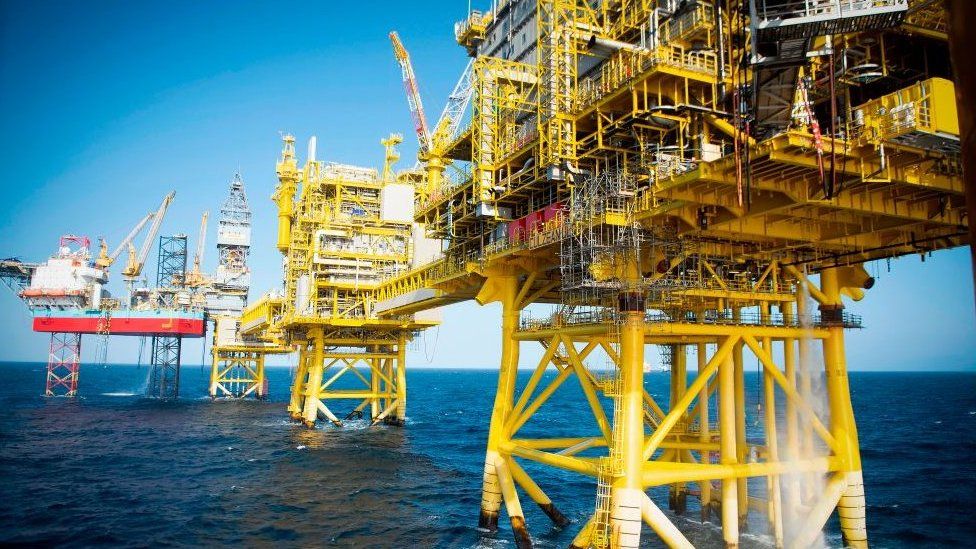Annual oil and gas licences planned with net zero commitment required
Licences for oil and gas projects in the North Sea are set to be awarded annually, under government plans.
There is currently no fixed period between licensing rounds – but this would change under a bill to be announced in Tuesday’s King’s Speech.
Ministers said projects would have to meet net zero targets and claimed the policy would “bolster energy security”.
Greenpeace said encouraging oil and gas production was “backward-facing” and vowed to fight new licences in court.
The plans draw a dividing line between the Conservatives and Labour, which says it wants to focus on investing in renewables energy, rather than fossil fuels.
Labour has said it will honour existing licences granted before the next general election, but would not allow any new ones if it won power.
Labour’s shadow energy security secretary, Ed Milliband, dismissed the plans as a “desperate political strategy” that would do “nothing to lower bills or deliver energy security”.
“We already have regular North Sea oil and gas licensing in Britain, and it is precisely our dependence on fossil fuels that has led to the worst cost of living crisis in a generation,” he said.
Energy Security Secretary Claire Coutinho told the BBC the government’s plans for oil and gas licences “wouldn’t necessarily bring energy bills down”.
Instead, Ms Coutinho said the new licences would improve “security” of energy supply, and raise tax revenues from oil and gas companies “that would help us for example fund public services”.
A spokesperson for the Department for Energy Security and Net Zero said the new policy would relate to offshore production licences.
Applications to explore oil and gas fields are assessed by the North Sea Transition Authority (NSTA), an independent regulator.
According to the trade body Offshore Energies UK, there are just under 300 active oil and gas fields in the North Sea. But more than half of them will have ceased production by 2030.
The current licencing round opened in October last year, with the first set of 27 licences granted earlier this month.
The government says the UK will still need oil and gas to meet its energy needs, even if it reaches its goal of net zero carbon emissions by 2050.
Net zero means no longer adding to the total amount of greenhouse gases in the atmosphere.
In its latest progress report, the government’s adviser, the Committee on Climate Change, said the “expansion of fossil fuel production is not in line with net zero”.
The committee said while the UK “will continue to need some oil and gas until it reaches net zero”, this did not “in itself justify the development of new North Sea fields”.
The government also argues importing energy from abroad creates more emissions overall, whilst also making the UK reliant on “hostile foreign regimes” such as Russia for its energy security.
Fossil fuels make up most of the UK’s energy mix, with oil and gas being used to generate electricity, heat homes and fuel vehicles.
The vast majority of UK gas supplies come from the UK’s North Sea fields, by pipeline from Norway, or by seaborne tanker from countries such as the United States and Qatar.
The UK has no direct dependence on Russian supply, with less than 4% of its gas sourced from the country in 2021.
But the Committee on Climate Change says the UK’s dependence on gas has left it exposed to the high energy prices seen globally in recent years.
And in 2022, former energy minister Greg Hands acknowledged UK production was not large enough to reduce energy bills, as prices are set by international, not local, markets.

King’s Speech
Under the government’s plans, a new law requiring an annual licensing process will be listed in the King’s Speech, where the monarch will set out the government’s law-making plans for the year ahead.
A licensing round would only take place if the UK is projected to import more oil and gas from abroad than it produces domestically.
The carbon emissions linked to UK gas production would also need to be lower than the equivalent emissions from imported liquefied natural gas.
These two tests are currently part of the government’s climate tests for new licences, known as the climate compatibility checkpoint. However, the bill would make them legally binding.
There have been questions raised about the government’s ability to meet its 2050 net zero target, with its climate advisers having warned the UK risks falling behind without much faster action.
In September, Prime Minister Rishi Sunak announced some changes to climate policies and extended some of the UK’s net zero deadlines.
Mr Sunak said he was committed to meeting the target in a “pragmatic and proportionate way” but without “unnecessarily adding costs and burdens to families”.

